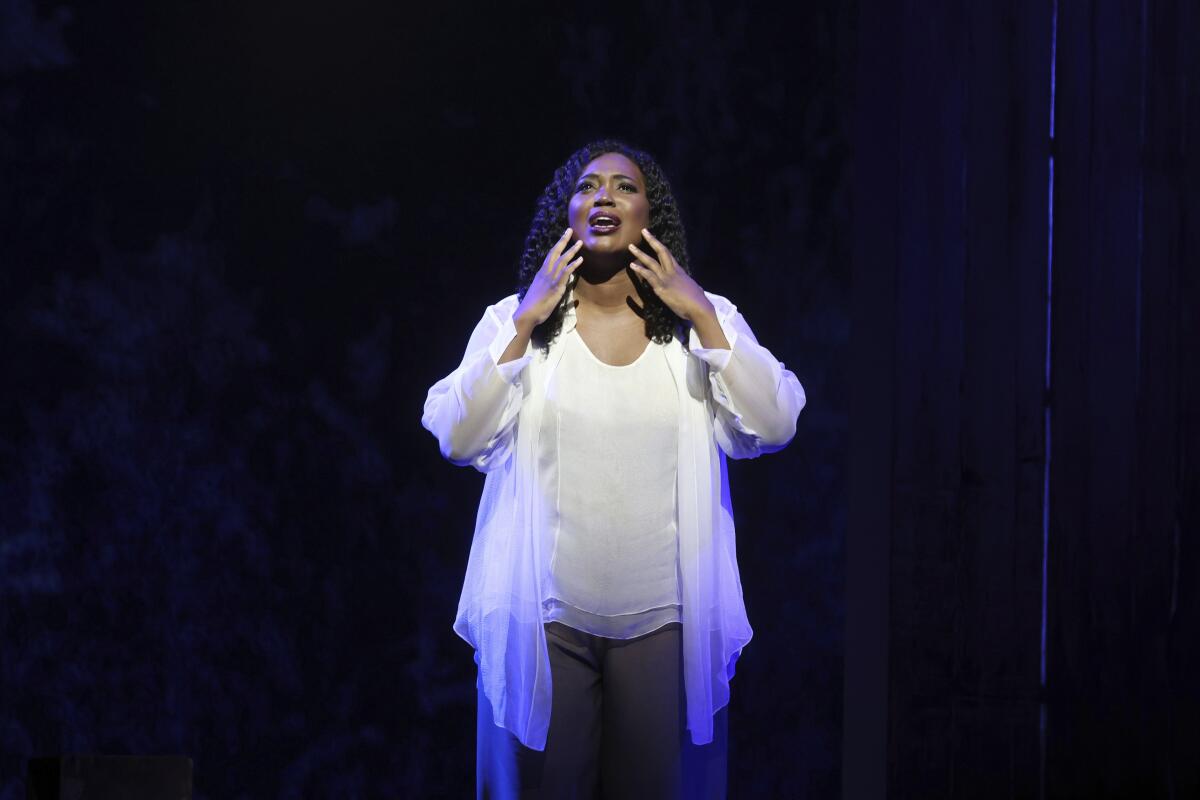California soprano pulls out of Italy opera, condemns theater’s use of blackface

ROME — Soprano Angel Blue says she won’t perform in an opera in Italy this month because blackface was used in the staging of a different work this summer on the same stage.
The U.S. singer, who grew up in Southern California and who has sung several roles for Los Angeles Opera, posted a note on her #angeljoyblue Instagram page saying she will be bowing out of “La Traviata” at Verona’s Arena this month because the theater recently mounted another Giuseppe Verdi opera, “Aida,” that had performers in blackface.
She blasted such use of “archaic” theatrical practices as “offensive, humiliating, and outright racist.”
For Angel Blue, the shows go on, despite racist snub
Angel Blue, however, was still listed Sunday on the Arena’s website as singing the role of Violetta in “La Traviata” on July 22 and 30.
The theater said it was hoping the soprano, who is Black, would accept an invitation to meet with Arena officials in a “dialogue” over the issue. The Arena, in a statement Friday, said it had “no reason nor intent whatsoever to offend and disturb anyone’s sensibility.”
For decades, U.S. civil rights organizations have publicly condemned blackface — in which white performers blacken their faces — as dehumanizing Black people by introducing and reinforcing racial stereotypes.
When she was born, Angel Joy Blue’s father, Sylvester Blue, held her up and noticed that she had a big upper chest and a good pair of lungs.
The Arena this summer has mounted performances of “Aida” based on a 2002 staging of the opera classic by Italian director Franco Zeffirelli, who died in 2019. That staging uses blackface.
“Dear Friends, Family, and Opera Lovers,” began the soprano’s Instagram post. “I have come to the unfortunate conclusion that I will not be singing La Traviata at Arena di Verona this summer as planned.”
Referring to Arena’s decision to use blackface makeup in “Aida,’’ the singer wrote: “Let me be perfectly clear: the use of blackface under any circumstances, artistic or otherwise, is a deeply misguided practice based on archaic theatrical traditions which have no place in modern society. It is offensive, humiliating and outright racist.”
George Sterne has sung with the L.A. Opera since the 1980s. He’s taken the spotlight and taken pratfalls. In June, he’ll be taking his final bow.
She wrote that she couldn’t “in good conscience associate myself with an institution which continues this practice.”
Blue’s Instagram account did not appear to be active as of Sunday evening.
The theater’s statement said “Angel Blue knowingly committed herself to sing at the Arena” even though the “characteristics” of the 2002 Zeffirelli staging were “well known.”
Still, the theater stressed its hope that her protest would ultimately improve understanding between cultures as well as educate Italian audiences.
“Every country has different roots, and their cultural and social structures developed along different historical and cultural paths,’’ said the statement by the Arena of Verona Foundation. “Common convictions have often been reached only after years of dialogue and mutual understanding.”
Originally meant for one or two outstanding singers, the inaugural Eva and Marc Stern Award will go to five opera singers facing pandemic closures.
The Arena statement stressed dialogue, “in effort to understand others’ point of view, in respect of consciously assumed artistic obligations.”
“Contraposition, judgments, labeling, lack of dialogue only feed the culture of contrasts, which we totally reject,” said the statement, appealing for cooperation “to avoid divisions.”
It’s not the first time that the use of blackface makeup for a staging of “Aida” in Verona has sparked a soprano’s protest. In 2019, opera singer Tamara Wilson, who is white, protested against darkening her face to sing the title character of an Ethiopian woman in the opera at the Arena.
More to Read
The biggest entertainment stories
Get our big stories about Hollywood, film, television, music, arts, culture and more right in your inbox as soon as they publish.
You may occasionally receive promotional content from the Los Angeles Times.











